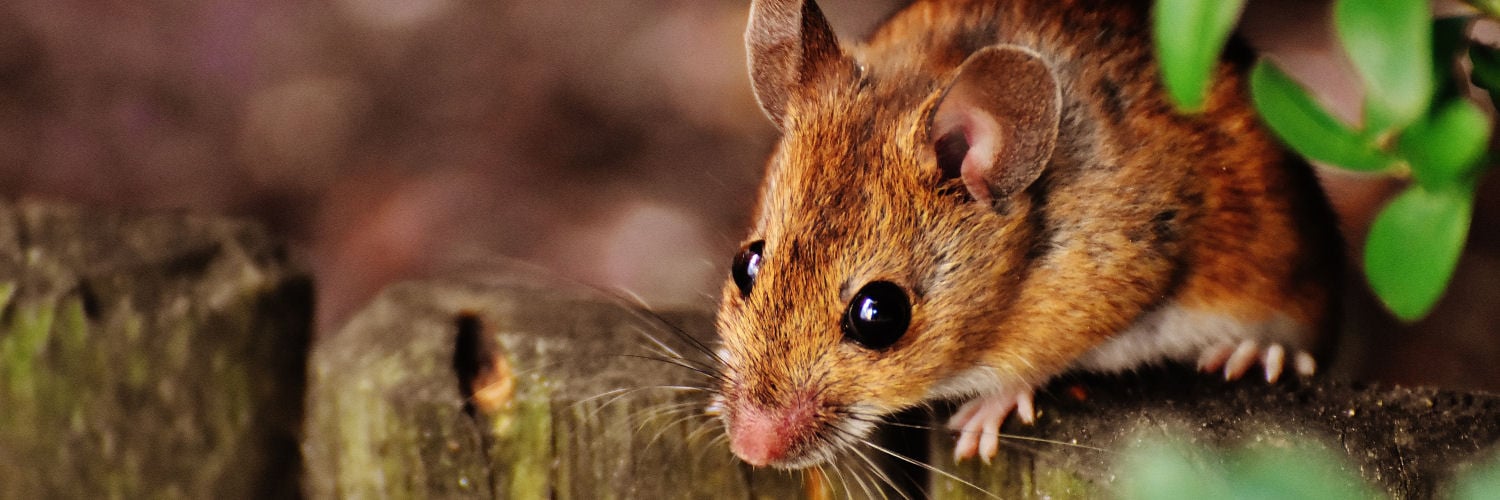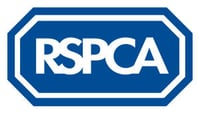 |
Caroline Francoli, Information and Education Adviser, RSPCA |
The Royal Society for the Prevention of Cruelty to Animals (RSPCA) works towards a world where all animals are respected and treated with kindness and compassion.
As such we believe that learning about the natural world and the interrelationship between the environment, animal welfare and the wellbeing of humans is vital. The proposed Natural History GCSE provides a perfect opportunity to address these crucial concepts and an animal welfare approach provides an important lens through which the importance of developing respect and a sense of responsibility for the environment can be developed.
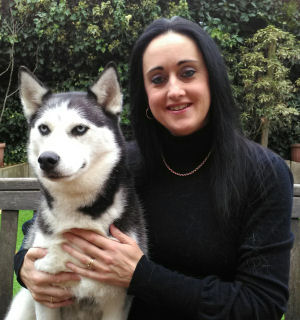
Animal welfare is now a mainstream issue. Our recent findings support the idea that it's fundamental to solving many of the social, economic and environmental challenges we all face. Just as our understanding of animals shapes our behaviour towards them, so too our attitudes towards animal welfare contribute to wider issues like inequality and climate change.
Animal Sentience
One of the key topics in our education programmes is encouraging young people and adults to recognise the sentience of animals. Having studied the perceptions of sentience in the wider public it is clear that more work needs to be done in terms of educating future generations of the scientific evidence around the concept of sentience.
We at the RSPCA feel that the importance of the recognition of sentience is a linchpin to developing compassion for our natural environment and the animals that inhabit it. Therefore the understanding of the importance of biodiversity will only be enhanced by the understanding that the animal life within that habitat is sentient and deserving of respect. It will also highlight another often neglected concept of ‘humans being part of the world and reliant upon it’.
Animal Kindness as part of our values
In 2022, the RSPCA undertook its first Kindness Index attitude survey, to establish the values people hold when it comes to animal welfare and related topics.
It is clear that the public recognises the interdependencies between humans, animals and the natural environment and desires change. Therefore we feel that it is vital that young people are given access to accurate information to allow them to form opinions based on fact.
People ranked animal welfare as one of their top three concerns - behind mental health and the environment - when considering a range of social and environmental issues.
This demonstrates that together with other issues, animal welfare is significant in the minds of the British public. (Figure 1)
Figure 1:
Causes that are important to the British public (respondents could choose up to three options) Kindness Index 2022
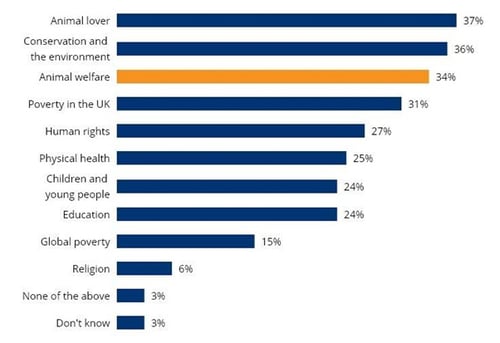
Animal welfare should be taught in schools
Our support of the creation of a Natural History GCSE is an integral way in which we, as the RSPCA, can seek to develop the next generation’s understanding of ‘The Human Impact on the World’ for the benefit and welfare of the planet, animals and humanity.
Our ‘Kindness Index’ made clear that there is overwhelming public support for animal welfare to be part of the school curriculum.
Most people (84%) agree that animal welfare should be taught in schools. This is an increase from 2018 when 78% of people were in support.
Education is devolved in England, Wales, Scotland and Northern Ireland, and support for animal welfare in schools is strong across all of these nations. Therefore giving young people the opportunity to develop their knowledge and understanding is vital and reflective of public opinion. (Figure 2)
Figure 2:
Agreement with whether animal welfare should be taught in schools by nation Kindness Index 2022
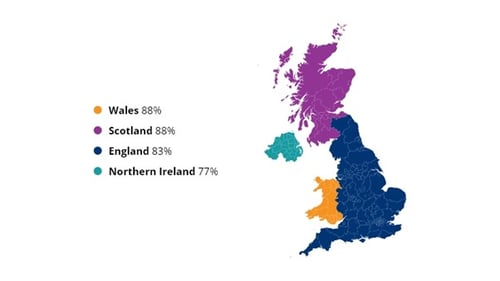
Teaching animal welfare can help students develop empathy, make more informed choices when shopping for food and other products and foster concern for animal welfare. There are also benefits to behaviour and interactions with peers - with young people demonstrating more compassion to others.
Human Impacts
We acknowledge that the welfare of animals is firmly connected to the fate of the environment. Respondents were asked how much of a negative impact different environmental issues have on animal welfare in the UK. The results suggest a strong recognition and correlation of the negative impact of environmental issues on animal welfare. This recognition by the wider public further strengthens the argument for the inclusion of ‘Human Impact upon the World’ within the GCSE. (Figure 3)
Figure 3:
How much of a negative impact respondents think environmental issues have on animal welfare in the UK Kindness Index 2022
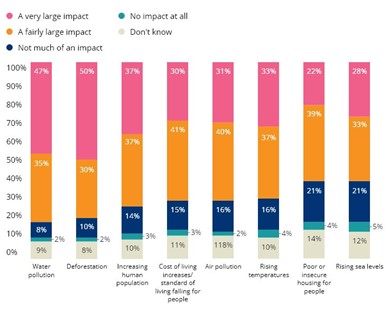
The RSPCA is ideally placed to inform and support best practice for the practical elements of this course. With the emphasis on study of terrestrial and aquatic animals we would be keen to advise on ways in which study is possible without negatively impacting upon the wildlife being studied. We could offer alternative ways to study that will mean that no student would be at a disadvantage when it comes to learning about nature within the UK, whilst preserving those very habitats we are seeking to learn more about in order to protect them. We would also be able to enhance and enrich the content of the Natural History GCSE, by providing sector leading data for analysis and examination. We would be able to provide real world examples and information to allow students to develop their understanding of the issue facing wildlife, farmed animals and pets. This will serve to enhance the subject and the teacher’s ability to deliver a meaningful learning experience.
Some facts and figures
There are billions of wild animals in the world and many of them come into contact with humans. Unfortunately, these interactions don't often benefit animals, so wildlife is an important part of our work. The welfare lens provides a valuable tool for evaluating human impact and identifying approaches that will mitigate the negative effects of climate change and environmental degradation.
Wildlife in trade
- 100 million wild animals are traded internationally each year.
Britain has:
- 4 million anglers who catch 200 million fish each year
- a commercial fishing fleet that catches 1,000 million fish every year.
Each year in Britain:
- 3 million wild mammals are shot, snared or trapped
- 15 million wild birds are shot
- 20 million rats and mice are killed as pests.
Unintentionally, each year, we kill and injure British wildlife
- 1 million mammals are killed or wounded by cars.
- Our cats kill and injure 100 million wild animals.
- 200,000 injured wild animals are admitted to Britain's rehabilitators.
The demand for education and knowledge of our natural world is being driven by young people themselves. The RSPCA is a partner in numerous youth-focused projects where young people are campaigning for learning about animals in schools and increased opportunities to gain work experience in the animal welfare sector. Our youth are prepared to vote with their feet: climate change protests and concerns over the way we treat pets and wildlife have shown a willingness to campaign, and to act. With upcoming generations hungry for the skills and knowledge to make sustainability happen, there has never been a better time, or a greater need, for a Natural History GCSE.
Animal welfare standards and dietary choices
It is recognised that our dietary choices are having a significant impact upon the natural world with deforestation and wildlife displacement a real issue.
As with climate change, globalisation can help knowledge-sharing, collaboration and the adoption of common standards and behaviours. COVID-19 is the latest warning that we are putting ourselves at risk if we don't act together, internationally. Deadly diseases have been jumping from animals to humans at least since the invention of agriculture 10,000 years ago and, probably, far longer; but now the combination of intensive farming, habitat destruction and globalisation is making these leaps more likely and the consequences more devastating.
Learning about these impacts through the inclusion of this topic within the Natural History GCSE will provide students with the tools they need to make informed and compassionate choices in their lives and to appreciate how their personal preferences affect and impact land usage, animals and the environment.
A Scientific Approach
A strength of the RSPCA is that we strive to base our policies, activities and approaches to promoting animal welfare on scientific evidence. We aim to be an authority on a wide range of animal welfare science by gathering, assessing and presenting comprehensive scientific and technical information and advice on a range of issues. But the approach must also capture hearts and minds. An unmissable opportunity is presented with the new Natural History qualification, to do just that.
In order to promote practical advances for animal welfare and our planet, ‘One Welfare’ is a new concept that highlights the interconnectedness of animal welfare, human wellbeing and the environment. It recognises that science is only part of the story, we should also be aiming to bring about human behaviour change, encouraging compassion and understanding in humans so that all animals, be they pets, wild animals or farm animals enjoy a better quality of life. As a result of this both humans and the planet benefit.
This appreciation of the natural world and the understanding of why it is so important to us, as humans, and all of the animal kingdom needs to be a core tenet of the Natural History Curriculum.
In conclusion
Our research in 2023 continues to reveal that a large proportion of UK people are committed to animal welfare. They love animals, they want our governments to keep them safe. And they understand that protecting animals means protecting the environment - and vice versa.
Despite growing public concern, the appreciation of the welfare needs of wild animals is often inadequate. A Natural History GCSE with carefully selected and considered content is the obvious solution to this problem and promises a future that is good for humans and good for animals.
Natural History taps into the growing movement of young people who care about the natural world. Our experience is that young people really want to know more about where they are living, what is around them, how the food they eat is connected to it and crucially, how that fits into wider climate change issues and animal welfare, biodiversity loss and sustainable diets.
We need to be positioning this fundamental understanding of our dependence on nature at the heart of education.
The RSPCA recognises that overall, as a nation, our intentions are to be kind. We are aware that much of the narrative can be very negative and we are keen to inspire and engage young people to realise that they have the power to make small changes to achieve positive outcomes for humans, animals and the planet.
Let’s equip our young people with the knowledge and skills to allow them to be what they want to be.
Caroline Francoli
Caroline Francoli works as part of the RSPCA’s National Education Team and specialises in their Tier 1 formal education projects, which offer free educational resources for all educators.
She is also part of the Pet Education Partnership, working with a group of the UK’s leading animal welfare charities to create a new, ground breaking and evidence led education programme for Primary aged children.
Having spent over twenty years as a teacher, across Key Stages, she has been an advocate for animal welfare her entire career. She has taught thousands of young people about the importance of compassion and protecting the natural environment.
Her passion is to make animal welfare education available and accessible to all young people and to inspire them to think about the needs of animals, help them understand about compassion and the importance of one welfare - people, planet and animals.
Keep up to date with our proposed GCSE in Natural History and other Cambridge OCR Natural History news by signing up our email newsletter and updates. You can read back issues of our Natural History newsletter here.
